Home Tags Posts tagged with "jfk’s"
jfk’s
Clint Hill, the secret service agent employed to protect Jackie Kennedy has recounted the terrifying moments after JFK’s assassination in 1963, and how the First Lady scrambled to reach his limp body.
In a memoir, Mrs Kennedy and Me, Clint Hill, now 80, reveals his sheer determination to throw himself between the Kennedys and the bullets as parts of JFK’s brain and skull splattered over his shirt.
As the secret service agent moved towards Jackie Kennedy, he watched her reaction: “Her eyes were filled with terror. She was reaching for something. She was reaching for a piece of the President’s head.”
Clint Hill was alongside the presidential vehicle when John F. Kennedy was shot in the neck and head before he slumped into his wife’s arms while driving through Dallas, Texas in November 1963.
The secret service agent is the figure in the famous Zapruder film of the shooting which shows him climbing onto the back of the president’s limousine.
In his book Mrs Kennedy and Me, Clint Hill recalled the crowds cheering for the motorcade and the moment he heard an explosion. He looked around and saw the president grab his throat.
“Somebody had fired a shot at the President, and I had to get myself between the shooter and the President and Mrs. Kennedy,” Clint Hill wrote.
“Nothing else mattered.”
Before he could reach them, two more bullets were shot – the final one hitting the president in the head, just above his right ear.
“The impact was like the sound of a melon shattering onto cement,” Clint Hill remembered, adding that John F. Kennedy’s blood and parts of his skull splattered over his clothes, face and hair.
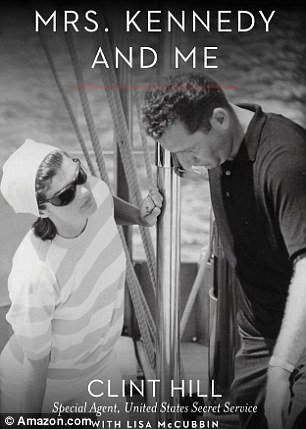
In his memoir, Mrs Kennedy and Me, Clint Hill reveals his sheer determination to throw himself between the Kennedys and the bullets as parts of JFK's brain and skull splattered over his shirt
Pulling Jackie Kennedy into her seat, the president’s body fell into her arms with his eyes open. “Jack, Jack, what have they done to you?” she wailed.
Clint Hill, who has previously said he could have taken the third bullet had he moved a second sooner, then had the thought: “How did I let this happen to her?”
Speaking to People magazine, which published excerpts of the book, Clint Hill added: “Because of the angles, the weather, where we were – everything – I did all I could. But I still feel guilt.”
He then goes on to describe the scene at Parkland Hospital, where he waited outside the trauma room with Jackie Kennedy. He describes how “the light was gone” from her eyes.
While there, Clint Hill took a call from the president’s brother, Robert Kennedy, who was demanding to know how bad the situation was.
Haunted by the image of JFK’s head being hit by the final bullet, but uncertain how to tell Robert Kennedy that his brother had been killed, Clint Hill said simply: “It’s as bad as it gets.”
As a doctor approached the group, they knew it was terrible news and Jackie Kennedy ran to be at her husband’s side. An agent approached Clint Hill and told him the president had died.
Later, the book recounts, Clint Hill accompanied Jackie Kennedy and Robert Kennedy to see the body.
Clint Hill remembers how, once there, Jackie Kennedy lovingly cut her husband’s hair with scissors that her secret service agent had brought, leaving chestnut locks on the blades when she gave them back.
He continued to work as Jackie Kennedy’s agent for a further year after the death. During his time working with the family, Clint Hill had grown close to the former first lady, which he admits was unusual.
Clint Hill recalled stories of sneaking cigarettes together in the back of the car during drives, and offering her advice ahead of the trip to Dallas after she expressed fears about their safety.
But despite what has been claimed in the past, Clint Hill did not love Jackie Kennedy.
“I admired her,” Clint Hill told People magazine.
“We grew closer and closer [but] I don’t think you can say I was in love with her.”
A year after the assassination, Clint Hill went to work for Lyndon Johnson. But he quit in 1975 after guilt he felt from the shooting made him turn towards alcohol.
Although Clint Hill kept in touch with Jackie Kennedy for a few years after he stopped working for her, when he heard about her struggle with cancer in 1994, he could not bring himself to lift the phone.
“I knew that the mere sound of my voice would take her back to that day that changed everything,” Clint Hill wrote.
“And the sound of her voice would do the same to me.”
Harvey Lee Oswald was accused of firing the three shots that killed John F. Kennedy. As he was being transferred to jail, he was shot in the stomach by a man, Jack Ruby, in the crowd.
Harvey Lee Oswald died in the hospital where John F. Kennedy had passed away 48 hours earlier.
According to an explosive new book by retired CIA agent Brian Latell, which is set to be released next month, Fidel Castro had advance knowledge that President John F. Kennedy was about to be killed in 1963.
Rumors about Fidel Castro’s involvement in a plot to murder his fierce adversary have swirled for almost half a century since communist sympathizer Lee Harvey Oswald shot JFK during a trip to Dallas in November 1963.
Now author Brian Latell, who studied Cuban affairs as a CIA analyst in the 1960’s and later became the agency’s chief intelligence officer for Latin America, says he is certain that Fidel Castro at least knew the attack was going to happen.
On the morning of November 22, 1963, the day JFK was killed, Fidel Castro ordered a senior intelligence officer in Havana to stop listening for non-specific CIA radio communications and concentrate instead on “any little detail, any small detail from Texas”, Brian Latell claims in his new book “Castro’s Secrets – the CIA and Cuba’s Intelligence Machine”, set for release next month.
Four hours later, the airwaves came alive with news that John F. Kennedy was dead.
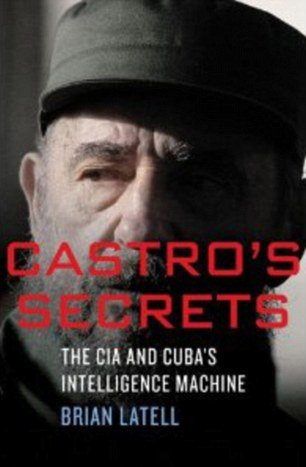
Fidel Castro had advance knowledge that President John F. Kennedy was about to be killed in 1963, claims Brian Latell in his book
Brian Latell also claims that Fidel Castro was aware that Lee Harvey Oswald, who had been denied a visa to visit Cuba at the country’s embassy in Mexico City, told staff there that he was going to murder JFK to prove his allegiance to the communist cause.
“Fidel knew of Oswald’s intentions and did nothing to deter the act,” Brian Latell writes in the book.
In an interview published in The Miami Herald, Brian Latell, now a respected senior lecturer on Cuba at the University of Miami, says he discovered the information in interviews with former Cuban intelligence officers, backed up by declassified US government documents.
“I don’t say Fidel Castro ordered the assassination, I don’t say Oswald was under his control. He might have been, but I don’t argue that, because I was unable to find any evidence for that,” Brian Latell said.
“[But] everything I write is backed up by documents and on-the-record sources.
“Did Fidel want Kennedy dead? Yes. He feared Kennedy. And he knew Kennedy was gunning for him. In Fidel’s mind, he was probably acting in self-defense.”
Brian Latell’s book, billed as the first in-depth study of Fidel Castro’s intelligence operations in the years after the Marxist revolutionary seized power in a 1959 coup, says there is other strong supporting evidence.
The book claims, for instance, that CIA wiretaps of Cuban intelligence agents in the immediate aftermath of the assassination revealed that they already had surprising level of knowledge of Lee Harvey Oswald’s background when only scant details had been reported by the media.
But it is Brian Latell’s interview with former Cuban intelligence officer Fiorentino Aspillaga Lombard, who was in charge of Fidel Castro’s listeners at his Havana compound, which will raise eyebrows.
Fiorentino Aspillaga Lombard, who defected to the US in 1987, told the author that he informed the CIA at his debriefing that Fidel Castro personally issued the order to listen specifically for anything about Texas.
But that information was never revealed publicly, and he never repeated it until he was interviewed for the book.
After his defection, Fiorentino Aspillaga Lombard lifted the lid on Fidel Castro’s lavish lifestyle, giving details of his fleet of luxury yachts, numerous lavish properties in each of Cuba’s provinces and a secret Swiss bank account containing millions of dollars.
But he said that while the population realized that “Fidel has ruined Cuba”, a fear of their leader meant few would ever speak up.
“Who can sanction Castro? What parliament or national assembly can ask for an explanation of what is done with that money?” Fiorentino Aspillaga Lombard said.
The claim that Fidel Castro was aware of Lee Harvey Oswald’s promise to Cuban embassy officials that he was going to murder John F. Kennedy comes from several sources, including a former FBI informant and “superspy” Jack Childs, who penetrated the dictator’s inner circle.
Jack Childs said that Fidel Castro told him that Lee Harvey Oswald “stormed into the embassy, demanded the visa, and when it was refused to him headed out saying: <<I’m going to kill Kennedy for this>>.”
Meanwhile, Fidel Castro was claiming publicly that Lee Harvey Oswald’s visit to the embassy was “a minor matter” that had not been noticed by senior officials in Havana.
Subsequent investigations by the US security agencies, and the official Warren Commission inquiry into John F. Kennedy’s assassination, looked at Fidel Castro’s possible involvement but concluded that Lee Harvey Oswald was a lone gunman acting independently.
Among other issues discussed in Brian Latell’s book are the CIA’s own attempts to assassinate Fidel Castro using a variety of methods, including exploding cigars and poison pens. Brian Latell says the efforts were called off after JFK died.
An explosive book claims that John F. Kennedy took the virginity of a White House intern in a side room, just feet away from where administration staff were drinking at an after-work party.
Mimi Alford, now 69, told how former president John F. Kennedy led her into “Mrs. Kennedy’s room” during a personal tour, where he proceeded to have sex with her.
Mimi Alford, a retired New York church administrator and grandmother, also revealed in her tell-all memoir details how, during a passionate 18-month affair with the commander-in-chief, he told her to perform a sex act on his friend as he watched.
She also claims the then 45-year-old president also stuffed party-drug amyl nitrate, more commonly known as poppers, under her nose after telling her it would enhance their sex life.
But during their romance, Mimi Alford said JFK never properly kissed her and that she was often forced to play “a waiting game” as to when she would see him.
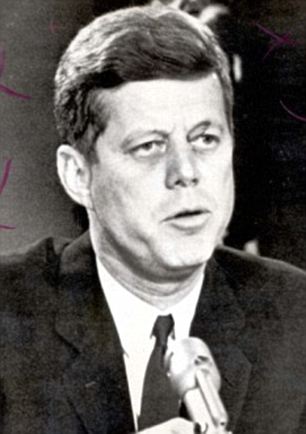
John F. Kennedy led the former intern into “Mrs. Kennedy’s room” during a personal tour, where he proceeded to have sex with her, Mimi Alford claims
Mimi Alford’s book “Once Upon a Secret: My Affair with President John F. Kennedy and Its Aftermath” tells the story of when the 19-year-old debutante from New Jersey landed a job in the White House press office.
It was just four days into her internship that Mimi Alford was invited for a midday swim in the White House pool, where JFK exercised to ease his chronic back pain, and where they spoke briefly.
Later that day, Mimi Alford was invited by his best friend Dave Powers to an after-work party, it was reported in The New York Post.
After drinking several cocktails, JFK took her on a “personal tour”, where she says he moved “closer and closer” until he was standing above her, guiding her onto the edge of a bed.
Mimi Alford wrote in the book: “Slowly, he unbuttoned the top of my shirtdress and touched my breasts. Then he reached up between my legs and started to pull off my underwear.
“I finished unbuttoning my shirtdress and let it fall off my shoulders.”
Mimi Alford said John F. Kennedy pulled down his trousers, but kept his shirt on, and paused when he noticed she seemed reluctant.
He asked her if she had done this before and she initially replied “No” but then changed her mind and said “Yes”.
After intercourse, Mimi Alford said: “He hitched up his pants and smiled at me.” She claims he pointed her to the bathroom and went back to the West Sitting Hall where they had met.
She said: “I was in shock. He, on the other hand, was matter-of-fact, and acted as if what had just occurred was the most natural thing in the world. On the ride home, it kept echoing in my head: I’m not a virgin anymore.”
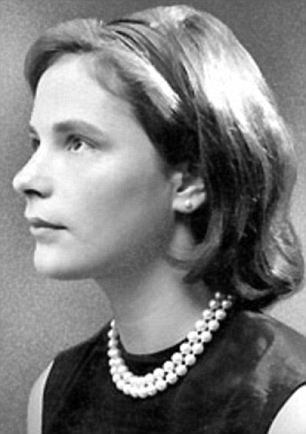
Mimi Alford's book “Once Upon a Secret: My Affair with President John F. Kennedy and Its Aftermath” tells the story of when the 19-year-old debutante from New Jersey landed a job in the White House press office
Mimi Alford said she went swimming with him again the next week and, although he “barely acknowledged” her arrival, they later ended up in another bedroom which was, she says, the start of the affair.
She said: “The fact that I was being desired by the most famous and powerful man in America only amplified my feelings to the point where resistance was out of the question. That’s why I didn’t say no to the president. It’s the best answer I can give.”
Mimi Alford, who ironically went to the same Miss Porter’s school as JFK’s wife Jackie, described the former president as “playful”, the sex as “varied and fun” and said he could be “seductive and playful”.
She said they spent a lot of time “taking baths” and that if they spent the night together, she would wear his own soft-blue cotton nightshirts.
But Mimi Alford also revealed complications in the relationship, saying they never kissed, and that she was often subjected to a “waiting game” where she was told to stay in her hotel until he called for her.
There is also a dark undertone to some of JFK’s actions in the book, such as when he “forced” her to sniff amyl nitrate, commonly known as poppers, during a Hollywood party at Bing Crosby’s desert ranch.
Mimi Alford said: “I was sitting next to him in the living room when a handful of yellow capsules – most likely amyl nitrate, commonly known as poppers – was offered up by one of the guests.
“The president asked me if I wanted to try the drug, which stimulated the heart but also purportedly enhanced sex.
“I said no, but he just went ahead and popped the capsule and held it under my nose. He didn’t try it himself. This was a new sensation, and it frightened me. I panicked and ran crying from the room.”
Mimi Alford also tells of how JFK asked her to “take care” of his friends Powers who “looked a little tense” while they were swimming in the White House pool.
“It was a dare, but I knew exactly what he meant. This was a challenge to give Dave Powers oral sex. I don’t think the president thought I’d do it, but I’m ashamed to say that I did… The president silently watched,” she said.
During the October 1962 Cuban Missile Crisis, where the U.S. and USSR had a nuclear stand-off, JFK reportedly told Mimi Alford that: “I’d rather my children red than dead.”
Mimi Alford, then Mimi Beardsley, also tells of how she erroneously believed at one point she was pregnant with JFK’s child, and another moment of when her lover reached out to her following the death of his infant son Patrick Bouvier Kennedy.
Mimi Alford wrote: “I had never seen real grief in my relatively short life. He invited me upstairs, and we sat outside on the balcony in the soft summer evening air. There was a stack of condolence letters on the floor next to his chair, and he picked each one up and read it aloud to me… Occasionally, tears rolling down his cheeks, he would write something on one of the letters, probably notes for a reply. But mostly he just read them and cried. I did, too.”
She said she saw President John F. Kennedy for the final time at The Carlyle hotel in Manhattan on November 15, 1963, just a week before his assassination in Dallas.
At this point Mimi Alford was due to be married to her college sweetheart, Tony Fahnestock.
“He took me in his arms for a long embrace and said, <<I wish you were coming with me to Texas>>. And then he added, <<I’ll call you when I get back>>. I was overcome with sudden sadness. <<Remember, Mr. President, I’m getting married>>.
“<<I know that>>, he said, and shrugged. <<But I’ll call you anyway>>.”
Recordings of the conversations between Air Force One and the White House communications office immediately after President John F. Kennedy assassination were made public this week.
One of the calls was between a White House radio operator who had to inform the Secretary of State that the President had been killed and that there was a new leader of the United States.
Another one was recorded between Vicepresident Lyndon Johnson and JFK’s mother was made by on board Air Force One just minutes after he was sworn in. The call reveals how he and his wife Lady Bird tried to console the Kennedy matriarch who was on the ground.
“I wish to God there was something that I could do and I wanted to tell you that we were grieving with you,” LBJ is recorded saying to Rose Kennedy.
“Thanks a mill- thank you very much, thank you very much. I know, I know you loved Jack, and he loved you,” Rose Kennedy responded.
All calls made on presidential plane are put through by a White House switchboard operator, which has a system in place to automatically tape the calls.
Mrs. Johnson is also recorded on the tapes, which captured the activity on the flight from Dallas, Texas to Washington on November 22, 1963, though part of her comments are cut off my an interjection by Rose Kennedy.
“Mrs. Kennedy, we feel like we just had-“Mrs. Johnson said.
“Yes, alright,” Mrs. Kennedy interjected.
“We are glad that the nation had your son as long as it did,” Mrs. Johnson continued.
“Yes, well thank you, Lady Bird. Thank you very much, goodbye!” Rose Kennedy said quickly.
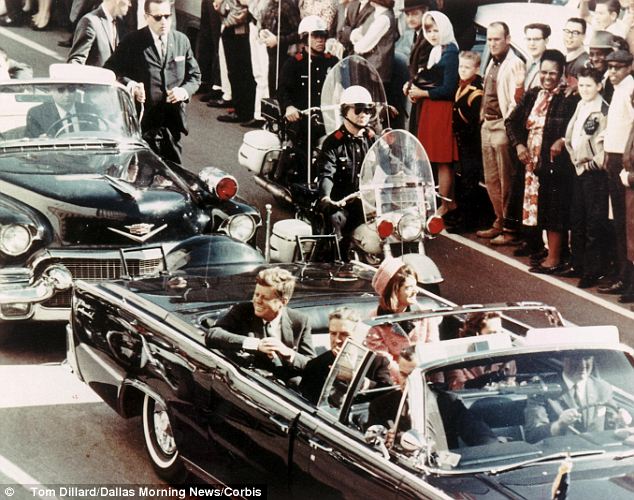
Recordings of the conversations between Air Force One and the White House communications office immediately after President John F. Kennedy assassination were made public this week
The Johnsons called Rose Kennedy at home at the Kennedy compound in Hyannis Port, Massachusetts, about 30 minutes after they took off from Dallas’ Love Field Airport.
While the conversation was extremely brief, the plane ride was a busy one as President Lyndon Johnson was sworn in just minutes before the flight took off.
In the air, LBJ was preparing the speech he was going to give once the plane landed just over two hours later.
Conspiracy theorists have been known to obsess over every detail surrounding the assassination of JFK, and are likely going to find fault with the fact that the 42 minutes of tape are only just being released now.
The tapes were found after the death of JFK’s top military aide Army General Chester “Ted” Clifton Jr., when his family found the recordings.
They sold his copy to a historical documents dealer, who then gave a copy to the National Archives.
Also included in the tapes is the moment when a White House operator tell the news to Secretary of State Dean Rusk, who was on a flight headed to Japan with several other cabinet members at the time.
“Kennedy apparently shot in the head,” said the unidentified radio operator.
“He fell face down in back seat of his car, blood was on his head, Mrs. Kennedy cried <<Oh no>> and tried to hold up his head.”
Another frantic notification call was included on the newly-released tape, this time of a military aide trying to look for his superior, General Curtis LeMay, who was often at odds with JFK.
General Curtis LeMay’s assistant called the White House call center and wanted desperately to be connected to his boss.
“General LeMay is in a C 140. … He’s inbound. His code name is Grandson. And I wanna talk to him. … If you can’t work him now, it’s gonna be too late, because he’ll be on the ground in a half-hour,” the aide said.
The urgency in the aide’s call will likely prompt some sinister speculation, though it is also easy to assume that he simply wanted to get the news of the assassination to his boss quickly.
The tapes confirm that, like Secretary of State Dean Rusk and several other cabinet members, Curtis LeMay was on various flights at the time.
The tapes of the calls from Air Force One come shortly after the Kennedy Library released some of the recordings from JFK’s last days in office.
While speaking to an aide three days before his death, then-President John F. Kennedy unknowingly refers to the day which would end up being his funeral as “a tough day”.
The conversation arises while his aides are attempting to sort out his schedule, which was expected to be very busy when he returned from his Dallas trip.
One of the meetings they were trying to schedule was with General Nasution of Indonesia.
“I will see him, when is here here? Monday?,” JFK says.
A staffer responds: “Monday and Tuesday.”
“Well that’s a tough day,” JFK remarks.
“It’s a hell of a day Mr. President. He’ll be coming back here though, I understand on Friday because I offered to entertain at dinner.”
The tapes also revealed JFK’s thoughts on the nearing 1964 election, a tender moment with his children, and conflicting reports about the ongoing operation in Vietnam.
[youtube IRyWDakgoV0]
John F. Kennedy’s presidential library has released the final 45 hours of his private recordings, representing the last months of JFK’s life.
The recordings include discussions on the growing conflict in Vietnam and plans for the 1964 election.
JFK recorded many of his White House meetings secretly, keeping their existence away from top aides.
The library has declassified and released portions of the tapes since 1993.

John F. Kennedy's presidential library has released the final 45 hours of his private recordings, representing the last months of JFK's life
Among the conversations recorded is JFK discussing his ill-fated trip to Dallas, Texas in November 1963, and what would become the day of his funeral.
“Monday?” he asks during a discussion about scheduling. “Well that’s a tough day.”
“It’s a hell of a day, Mr. President,” a staffer replies.
“Although on the one hand releasing the final recordings is a bittersweet milestone, on the other, we hope that the public will appreciate having the opportunity to hear these important discussions first hand,” Maura Porter, the library’s archivist, said in a statement.
Maura Porter told the Associated Press news agency that Kennedy may have been saving the tapes for a potential memoir.
Another possible reason for making the tapes was JFK’s concern that US military leaders had given a different public account of a discussion over the botched Bay of Pigs invasion.
In a meeting between John F. Kennedy and advisers about developments in South Vietnam, the president seems both frustrated and amused that his military and diplomatic advisors have given him contradictory reports on the state of the country.
General Victor Krulak reported “the Viet Cong war will be won” with the US military and social programmes in place in the country at that time.
Meanwhile, state department advisor Joseph Mendenhall told the president that many in the South Vietnamese government considered the war against the Viet Cong “secondary” to concerns about the regime in Saigon, and that student groups were considering moving to Viet Cong’s side.
“You both went to the same country?” JFK asks.
By November 1963 Kennedy’s mind was already focusing on the 1964 presidential election that he would not live to campaign in. As the incumbent, he worried about how to bring young voters to the Democratic Party.
“The younger people, party label – what is it that’s going to make them go for us,” JFK asks. “What is it we have to sell them? We hope we have to sell them prosperity but for the average guy, the prosperity is nil… And the people who really are well off, hate our guts.”
There is also discussion about the impact of filming the Democratic convention in colour, even when most TV viewers would still see it in black and white.
“I don’t know if maybe they’d come over the NBC one in colour,” he says. “Probably a million watching it in colour and it would have an effect… Be quite an effect on the convention. The colour is so damn good. If you do it right.”
John F. Kennedy made over 260 hours of recordings of both meetings and telephone conversations during almost three years in office.
Of the final hours of recordings released on Tuesday, Maura Porter said officials excised about five to 10 minutes of family-related discussions and about 30 minutes because of national security concerns.
George magazine, founded by John F. Kennedy Jr., famously featured on its covers Cindy Crawford as George Washington and Drew Barrymore as Marilyn Monroe.
Now is said that JFK’s late son asked Madonna to pose for the cover of his political lifestyle magazine in 1996, as his conservative mother Jackie Kennedy Onassis.
But, Madonna flirtatiously declined his offer, insisting she could “never do [Jackie O.] justice”.
As the New York Post reports, JFK Jr. told his assistant RoseMarie Terenzio about his idea for a photo shoot that would see Madonna portraying the former First Lady for the September “Women in Politics” issue.
RoseMarie Terenzio recalls in her upcoming book, “Fairy Tale Interrupted”, suggesting instead then-First Lady Hillary Rodham Clinton shoot for the issue.
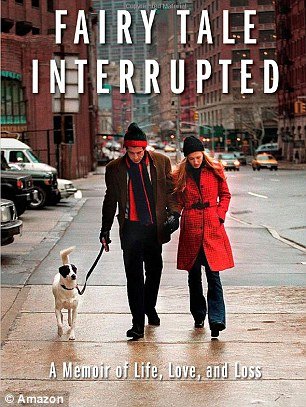
RoseMarie Terenzio, JFK Jr.’s former assistant, recalls in her upcoming book, “Fairy Tale Interrupted”, how he asked Madonna to pose as Jackie Kennedy for the George magazine cover
But JFK Jr., who founded George with Michael J. Berman in 1995, had more sensational ideas.
“We’ll have her in a pillbox hat, sitting on a stack of books,” RoseMarie Terenzio recalls her then-boss saying.
RoseMarie Terenzio says she was hesitant to support the idea, warning her then-boss he would create a “media s***storm” putting Madonna on the cover, given the pair’s once-rumored romance.
They drafted a letter to the Madonna anyway, asking the singer to pose as America’s beloved Jackie O.
But the photo shoot never came to fruition. The next day, RoseMarie Terenzio said, they received a handwritten reply from the star via fax declining the offer.
According to a letter published by the Post, addressed with a wink to “Johnny Boy”, Madonna quipped: “My eyebrows aren’t thick enough, for one.
“When you want me to portray Eva Braun or Pamela Harriman, I might say yes!” Madonna wrote, referring to Hitler’s mistress and the British socialite.
Drew Barrymore took Madonna’s slot for that issue, portraying another blonde bombshell – JFK Jr.’s father’s rumored lover, Marilyn Monroe.
“Fairy Tale Interrupted”, which chronicles RoseMarie Terenzio’s five years as JFK Jr’s publicist, is due out later this month.
RoseMarie Terenzio said she worked for him until JFK Jr. died in 1999 at the age of 38.
George magazine closed in 2001.
A team of historians and retired Secret Service officers led by historian Max Holland has used new technology to categorically confirm in their minds the judgement that Lee Harvey Oswald acted alone when he killed John F. Kennedy 48 years ago.
Max Holland, who has investigated JFK’s assassination moment for years, led a team which digitally enhanced a number of home videos taken on November 22, 1963.
Max Holland’s team studied Abraham Zapruder’s famous footage as well as many other lesser-known films, and brought them all together for the first time to establish a narrative more clear than ever before.
The team will present their findings in documentary “JFK: The Lost Bullet” on the NatGeo channel this Sunday at 9:00 p.m. ET.
Max Holland told Fox News:
“I’d say a main thrust of it is to break the stranglehold that the Zapruder film has on our perception of what happened.”
“In a sense, we’ve all been <<Zaprudered>>. The film was so graphic, disturbing, mesmerising, that it became more of our perspective on the assassination than even the perspective of the assassin, which should never have happened.”
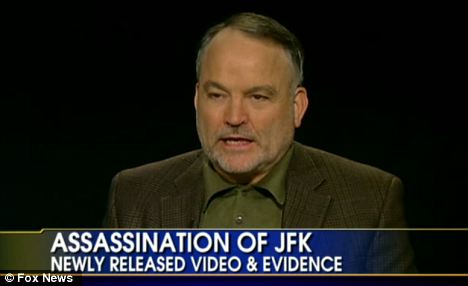
Max Holland, who has investigated JFK's assassination moment for years, led a team which digitally enhanced a number of home videos taken on November 22, 1963
The group also discovered, in the amateur footage taken that day by Robert Hughes, a shadowy figure moving on the sixth floor of the Texas School Book Depository building – a person believed to be Lee Harvey Oswald.
Lee Harvey Oswald was an employee at the Texas Schoolbook Depository, which overlooked the motorcade.
Contemporary investigators found that in March 1963, Lee Harvey Oswald, using the alias “A. Hidell”, purchased a 6.5mm Carcano Model 91/38 rifle by mail order. It is widely agreed this was the gun which killed John F. Kennedy.
Max Holland told Fox News: “Our conclusion is that he fired three shots in about 11 seconds, which is almost double the <<Six Seconds in Dallas>> meme that most people know when they think about the assassination: six seconds, three shots in six seconds.
“We say three shots in 11 seconds, which is a much easier – for I’d say, someone of Oswald’s skill – effortless task.”
President John F. Kennedy was assassinated as he travelled in an open-top car in a motorcade through Dallas. Texas Governor John Connally was also injured.
Within two hours, Lee Harvey Oswald was arrested for the murder of a policeman, then early the next morning he was charged with assassinating JFK.
On the morning of November 24, nightclub owner Jack Ruby shot and killed Lee Harvey Oswald as he was being transferred to the county jail.
There have been numerous conspiracy theories around JFK’s death, with everyone from the American Mafia and the KGB to FBI director J. Edgar Hoover and sitting Vice President Lyndon B. Johnson accused of involvement.
Each theory and every year hundreds of sceptics flock to the site to discuss the latest developments and pay their respects.
When asked by Fox News if there are any “holy grails” of JFK assassination research still not investigated, Max Holland cited Lee Harvey Oswald’s tax returns, which have never been released.
It is widely believed that Lee Harvey Oswald shot three bullets from his rifle. One missed entirely, a second hit John F. Kennedy and passed through Governor John Connally, the third was the fatal shot to the President.
Through FBI testing it was established the gun could be fired by an experienced shooter three times within five to eight seconds.
But in Governor John Connally’s own words: “There were either two or three people involved, or more, in this — or someone was shooting with an automatic rifle.”
John Connally’s wife believed that her husband was hit by a bullet that was separate from the two that hit Kennedy.
In the Zapruder film, the JFK’s head appears to move backwards after the last, fatal shot, an indication to some that a bullet was fired from the front.
There have been witness statements that two men were seen on top of a grassy knoll to the west of the Texas School Book Depository before the shooting.
[youtube 1q91RZko5Gw]
[youtube OxW16fz2qKs]
Gunilla von Post, the Swedish socialite, who had an affair with John F. Kennedy, died at 79.
Gunilla von Post was just 21 when she began seeing JFK, when he was 36 and Massachusetts senator.
JFK and Gunilla von Post affair began just a few weeks before his marriage to Jacqueline Bouvier and continued two years after their wedding.
Gunilla von Post went on to tell all in her memoir Love, Jack, which came out in 1997.
Swedish socialite and JFK met by chance in the French Riviera in August 1953.
Gunilla von Post had been sent there by her aristocrat father to brush up on her French.
John F. Kennedy was immediately blown away by her natural blonde beauty.
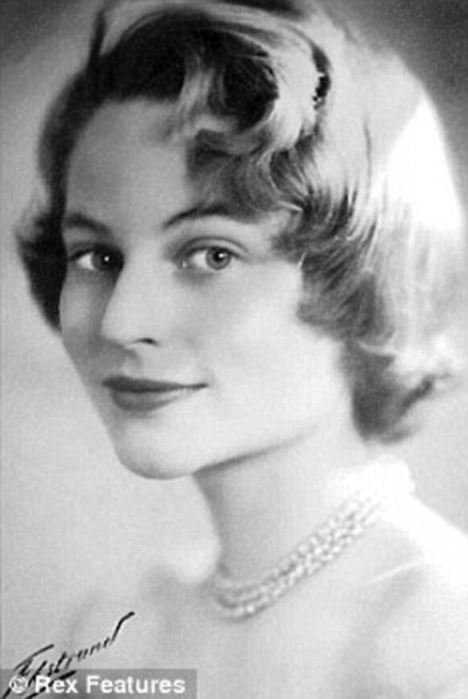
JFK and Gunilla von Post affair began just a few weeks before his marriage to Jacqueline Bouvier and continued two years after their wedding
The lovers spent one evening together in which, she recalled: “He turned and kissed me tenderly and my breath was taken away.
“The brightness of the moon and stars made his eyes appear bluer than the ocean beneath us.”
JFK admitted he was about to get married and sure enough, three weeks, on September 1 1953, he married Jacqueline Bouvier.
The love letters and trans-Atlantic phone calls soon followed and JFK told her he wanted to see her again.
John F. Kennedy visited Sweden with a friend in 1955 and the relationship was consummated in August 1955.
Gunilla von Post wrote: “I was relatively inexperienced, and Jack’s tenderness was a revelation. He said, <<Gunilla, we’ve waited two years for this. It seems almost too good to be true, and I want to make you happy>>.”
A week later they said their tearful goodbyes and a few painful months ensued.
According to Gunilla von Post, JFK called his father Joe to tell him he wanted to divorce Jackie and marry her.
JFK’s father said that would destroy his chances of reaching the White House.
He tried to get Gunilla von Post to move to New York and take up modelling but she said she would only do that if they were married.
It was a catch 22 situation which JFK ended with one last handwritten note in which he admitted his emotions were “complicated”.
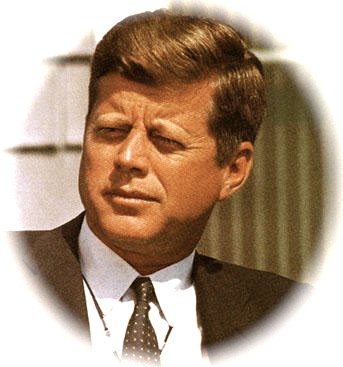
According to Gunilla von Post, JFK called his father Joe to tell him he wanted to divorce Jackie and marry her
Gunilla von Post wrote of her short, sweet romance: “I borrowed him for a week, a beautiful week that no one can take away from me.”
Born on July 10, 1932, in Stockholm, her full name was Karin Adele Gunilla von Post.
Gunilla von Post went on to marry wealthy Swedish landowner Anders Ekman and three years later she had one final meeting with JFK.
Gunilla von Post and her husband were guests at a charity ball at the Waldorf Astoria, New York, which was also attended by JFK and Jacqueline Kennedy.
She scribbled a note on a napkin at her table and asked a waiter to pass it to the senator.
Moments later JFK signalled to meet him in a corridor.
Gunilla von Post wrote: “He just gave me a huge hug. And then he said <<It’s wonderful to see you. I love you>>.” She said “it was lovely”.
Gunilla von Post trained in hotel management and cookery and attended a finishing school in Lausanne.
JFK’s affairs, from Marilyn Monroe to the reputed girlfriend of a Mafia boss, have been well documented.
Those who doubted Gunilla von Post’s accounts were forced to eat their words last year when she decided to sell 11 of JFK’s handwritten letters and three telegrams on a Chicago online auction site.
The letters were all written after his marriage. In the first, sent five months after his marriage in March 1954, JFK asked: “Do you remember our dinner and evening together this summer at Antibes and Cagnes?”
In another letter JFK wrote: “I thought I might get a boat and sail around the Mediterranean for two weeks with you as crew. What do you think?”
Unfortunately for the lovelorn couple, JFK then sent a telegram cancelling it after suffering a back injury that needed surgery.
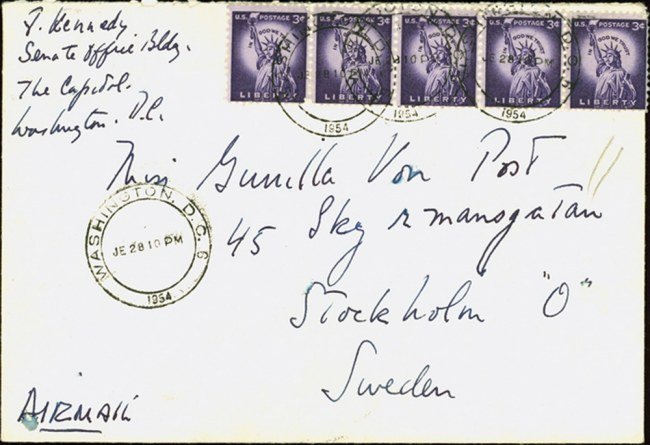
Those who doubted Gunilla von Post's accounts were forced to eat their words last year when she decided to sell 11 of JFK’s handwritten letters and three telegrams on a Chicago online auction site
The sale of the letters raised $115,537.50, beating the original estimate of $50,000.
Anders Ekman died in an accident, and Gunilla von Post later married Weisner Miller, an American IBM executive, and moved to America.
The second marriage ended in divorce, but Gunilla von Post continued to enjoy life on the international social circuit, supporting charities and moving between homes in Palm Beach, Sweden, the south of France and Switzerland.
Gunilla von Post is survived by two daughters of her first marriage and a son of her second.
According to Chris Matthews’ book, Jack Kennedy: Elusive Hero, JFK stole what was to become the best known quote of his 1961 inaugural address – “Ask not…” – from his old headmaster.
JFK enraged his former classmates by plagiarizing the line “ask not what your country can do for you – ask what you can do for your country”, which they had heard “time and time again” in a similar form at school.
While JFK‘s presidential rival Richard Nixon became infamous for his dirty tricks, the book claims Kennedy was not above playing some of his own.
In the pivotal televised debate of the 1960 U.S. election, JFK demanded a ban on candidates wearing make-up – then applied some anyway.
It meant John F. Kennedy appeared tanned and natural, while Richard Nixon, his Republican opponent, looked haggard and sweaty, almost derailing his campaign.
U.S. author Chris Matthews makes the claims in Jack Kennedy: Elusive Hero. The author unearthed notes written by George St John, the President’s former headmaster at Choate School in Connecticut, which suggest he had been aware of the “ask not” line for many years.
George St John’s notes quote a Harvard College dean’s refrain: “As has often been said, the youth who loves his Alma Mater will always ask not <<what can she do for me?>> but <<what can I do for her?>>”
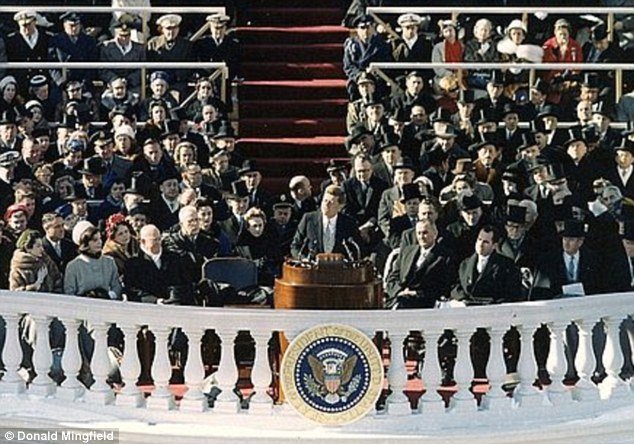
JFK enraged his former classmates by plagiarizing the line "ask not what your country can do for you – ask what you can do for your country", which they had heard "time and time again" in a similar form at school
Chris Matthews’ book also includes a reply to a questionnaire about JFK’s time at the school, sent to his former classmates when he was President. One of the students wrote: “I boil every time I read or hear the <<Ask not… etc.>> exhortation as being original with Jack.
“Time and time again we all heard [the headmaster] say that to the whole Choate family.”
JFK’ speech, delivered at his inauguration on Capitol Hill on January 20, 1961, was not, it seems, the first time he had resorted to underhand tactics.
Chris Matthews claims in the book that JFK gave himself an unfair advantage when he squared off against Richard Nixon in the first of four televised “Great Debates” on September 26, 1960, the first time such an event had taken place in America.
While JFK was charismatic and seemed at ease, Richard Nixon appeared shifty and blended into the background because of his grey suit.
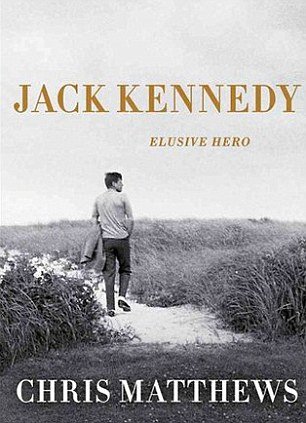
According to Chris Matthews' book, Jack Kennedy: Elusive Hero, JFK stole what was to become the best known quote of his 1961 inaugural address - "Ask not..." - from his old headmaster
According to the author, JFK had a helping hand, as his camp had insisted there was a ban on make-up, but then did not follow their own rules. Richard Nixon’s did, with disastrous consequences.
When Richard Nixon’ sweating started to become apparent and his staff secretly turned down the thermostat in the studio, JFK’s team quietly put it back up.
For the 70 million viewers watching at home – for whom it was the first chance to see both candidates – the contrast was striking.
History tells us that JFK won the debate, but some studies have found that those who heard the debate on the radio actually preferred Richard Nixon.
In the end, appearance triumphed over substance and JFK won the election. He went on to serve as president until 1963, when he was assassinated.
Richard Nixon had to wait until 1969 to enter the White House, remaining President until 1974, when he was forced to resign over the Watergate scandal.
The extraordinary revelation is sure to raise eyebrows among historians when Chris Matthews’ book is published this week.
The “Ask not…” speech has long been thought to have written with the input o JFK’s poetic speechwriter Theodore C. Sorensen.
Theodore C. Sorensen, who died in 2010, helped idealize and immortalize the JFK’s tragically brief administration.
The speecwriter was best known for working with JFK on passages of soaring rhetoric, including the 1961 inaugural address, which also proclaimed that “the torch has been passed to a new generation of Americans”.
But who wrote what has always been blurred – political historians say that John F. Kennedy and Theodore C. Sorensen were so inextricably linked that perhaps only they knew who scripted what parts of the speeches.
Theodore C. Sorensen, an adoring follower of JFK, never took credit for the president’s timeless phrases – saying that it was a totally collaborative effort.
What is certain is that of the many speeches Theodore C. Sorensen helped compose, JFK’s inaugural address shone the brightest.
Bartlett’s Familiar Quotations includes four citations from the speech – about a seventh of the entire address, which built to the unforgettable “Ask not…” exhortation.
Much of the roughly 14-minute speech – the fourth-shortest inaugural address ever, but in the view of many experts rivalled only by Abraham Lincoln’s – was marked by similar sparkling phrase-making.
Theodore C. Sorensen said he drew inspiration for the speech from the Bible, from Abraham Lincoln – and from the rousing wartime speeches of British prime minister Winston Churchill.
Chris Matthews, 65, is a former presidential speechwriter for Jimmy Carter and press secretary for long-time Speaker of the House of Representatives, Tip O’Neill.
Chris Matthews’ book, Jack Kennedy: Elusive Hero, published this week, is his sixth book.
Highlights of JFK’s 1961 inaugural address
Frequently cited as one of the best speeches ever made, JFK’s 14-minute inauguration address in January 1961 was marked by sparkling phrase-making, including:
* “Let every nation know, whether it wishes us well or ill, that we shall pay any price, bear any burden, meet any hardship, support any friend, oppose any foe, in order to assure the survival and the success of liberty.”
* “If a free society cannot help the many who are poor, it cannot save the few who are rich.”
* “So let us begin anew, remembering on both sides that civility is not a sign of weakness, and sincerity is always subject to proof.”
* “Let us never negotiate out of fear, but let us never fear to negotiate.”
* “We dare not tempt them with weakness. For only when our arms are sufficient beyond doubt can we be certain beyond doubt that they will never be employed.”
* “And so, my fellow Americans – ask not what your country can do for you, ask what you can do for your country.”
[youtube BLmiOEk59n8]
ABC News’ Diane Sawyer will host a prime-time, two-hour special based on the tapes Tuesday, September 13, featuring exclusive, never-before-heard extended audio of Jacqueline Kennedy’s oral history, rare photographs, plus an exclusive interview with Caroline Kennedy.
The audio and transcripts of the interviews, conducted by friend and longtime JFK aide, historian Arthur M. Schlesinger Jr., are being released in book form this month in “Jacqueline Kennedy: Historic Conversations on Life with John F. Kennedy.”
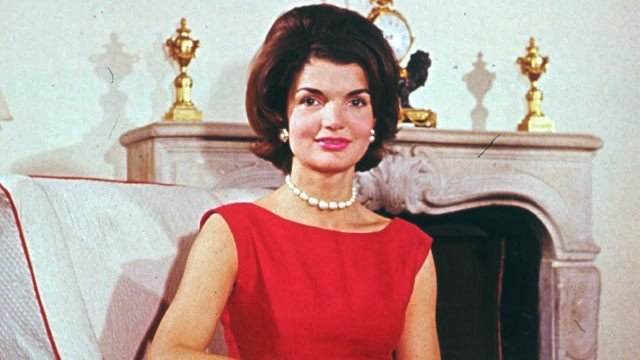
ABC News airs "Jacqueline Kennedy: In Her Own Words" in a two-hour special reported by Diane Sawyer
JFK’s brief presidency, ended with an assassin’s bullet in November 1963, still has an enormous influence on many today, not just for its actual policies and actions but also for the notion of “Camelot,” a mythologized, golden moment in American politics full of hope, promise and high style.
And no one knew “Camelot” better than First Lady Jacqueline Kennedy (later Onassis).
Tuesday at 9 p.m. Eastern/Pacific time, ABC News airs “Jacqueline Kennedy: In Her Own Words” in a two-hour special reported by Diane Sawyer.
By Jackie Kennedy’s request, the never-heard recordings were kept under seal until after her death in 1994, but the Kennedy Library in Boston has held them back until this month.
According to some reports the tapes were not to be released until 50 years after the former first lady’s death. But daughter Caroline Kennedy Schlossberg, the last surviving child of John F. Kennedy and the de facto protector of the family legacy who had her own brief unsuccessful flirtation with politics, decided to release them early.
ABC News disputed reports of sexual content in the recordings, but they do reveal candid insights into Jacqueline Kennedy’s feelings and thoughts about Lyndon Johnson, the Vietnam War and the Reverend Martin Luther King Jr.
Among other stories, it is reported that Jackie Kennedy believed JFK was skeptical of success in Vietnam.
On his appointing Republican Henry Cabot Lodge as US ambassador to Vietnam, Jacqueline Kennedy says:
“I think he probably did it … rather thinking it might be such a brilliant thing to do because Vietnam was rather hopeless anyway, and put a Republican there.”
Believing FBI Director J. Edgar Hoover’s report that his agency’s wiretaps revealed Martin Luther King Jr. tried to arrange a sex party while in the nation’s capital for the historic March on Washington in August 1963, Jackie Kennedy says:
“I just can’t see a picture of Martin Luther King without thinking, you know, that man’s terrible.”
Those original surveillance tapes of Martin Luther King Jr. remain sealed by court order until 2027.
According to ABC News, Jacqueline Kennedy also recalls a scene in which historian David Donald in 1962 spoke to JFK and some of his friends and aides about Abraham Lincoln’s presidency.
Jacqueline Kennedy reports her husband’s reaction, saying,
“<<Do you think>> – it’s the one thing that was on his mind – <<would Lincoln have been as great a president if he’d lived?>>. And Donald, really by going round and round, had agreed with him that Lincoln, you know, it was better – was better for Lincoln that he died when he did.”
[youtube 5C-8I-A5fNs]
The former First Lady, Jackie Kennedy talked about her disgust towards Martin Luther King after claimed he tried to arrange a sex party while in Washington for a march.
In the interviews that will be released in series starting with September 13, Jackie Kennedy also talks about how she could barely look at images of the iconic leader after he apparently also made derogatory remarks at JFK’s funeral.
Jacqueline Kennedy’s relationship with Dr. Martin Luther King became strained as a result of wire taps arranged by FBI director J. Edgar Hoover.
Those taps allegedly caught Dr. King Jr. trying to arrange a sex party in Washington, although this has been dismissed by some material concocted by Hoover to damage Martin Luther King.
Nonetheless, Jackie Kennedy branded Martin Luther King “tricky” and a “phoney” after hearing of the FBI recordings.
In the first interview that interviews to be broadcast on September 13, the former First Lady said:
“I just can’t see a picture of Martin Luther King without thinking, you know, that man’s terrible.”

Jackie Kennedy branded Luther King "tricky" and a "phoney" after hearing of the FBI recordings
Jackie Kennedy said Martin Luther King had mocked her husband’s funeral and Cardinal Richard Cushing, who celebrated Mass at the funeral.
“He made fun of Cardinal Cushing and said that he was drunk at it,” Mrs. Kennedy said.
“And things about they almost dropped the coffin.”
The Jackie Kennedy secret interviews also reveal that JFK saw U.S. participation in Vietnam as “hopeless” and scorned the idea of Lyndon Johnson succeeding him in office.
In the explosive memoirs from the secret tapes, Jackie Kennedy reveals that JFK was highly skeptical about victory in Vietnam.
The secret recordings will be revealed this month on the 50th anniversary of JFK’s first year in office, also describe how former President Kennedy feared what would happen if rival Lyndon Johnson took office.

Jackie Kennedy secret recordings will be revealed this month on the 50th anniversary of JFK's first year in office
JFK chose Lyndon Johnson, a Texas senator and former political rival, as his running mate in 1960 but later fretted about a LBJ (Lyndon Baines Johnson) presidency.
Jackie Kennedy’ secret tapes were recorded starting few months after JFk’s assassination in November 1963 by historian and former JFK aide Arthur Schlesinger.
In another interview of Jackie Kennedy with Arthur Schlesinger, she said:
“Jack said it to me sometimes. He said, <<Oh, God, can you ever imagine what would happen to the country if Lyndon were president?>>”
Jacqueline Kennedy also told how JFK and his brother, then-Attorney General Robert F. Kennedy even discussed ways to prevent Johnson from winning the Democratic nomination in a future contest.
“He didn’t like that idea that Lyndon would go on and be president because he was worried for the country,” she said.
“Bobby told me that he’d had some discussions with him.
“I forget exactly how they were planning or who they had in mind. It wasn’t Bobby, but somebody. Do something to name someone else in ’68.”
Lyndon Johnson was sworn in as the 36th U.S. president on Air Force One just two hours after JFK’s assassination.
LBJ was re-elected in his own right in 1964, but declined to run for presidency in 1968.

Jackie Kennedy also told how JFK and his brother, Robert F. Kennedy even discussed ways to prevent Johnson from winning the Democratic nomination in a future contest
The “Jacqueline Kennedy: Historic Conversations on Life with John F. Kennedy,” book includes a series of revealing interviews with the former first lady.
Jackie Kennedy said JFK was highly about victory in Vietnam, a central battleground of the Cold War and the conflict that brought down Johnson’s presidency.
She also said that President Kennedy, a Democrat, had named Henry Cabot Lodge, a Republican he had defeated for a Massachusetts Senate seat in 1952, as U.S. ambassador to Vietnam because JFK was so doubtful of military success there.
“I think he probably did it… rather thinking it might be such a brilliant thing to do because Vietnam was rather hopeless anyway, and put a Republican there,” Jackie Kennedy said.
Kennedy increased the U.S. presence in Vietnam throughout his brief administration, adding military advisers to help train the South Vietnamese military.
Lyndon Johnson, while was president, escalated the war in Vietnam by later committing ground troops to the conflict despite initial promises not to. Historians still debate whether Kennedy would have done the same.
The interviews where the former first lady speaks candidly about life in the White House have been sealed in a safe until this year.
Over seven sessions with Schlesinger thought to have been recorded just months after Kennedy’s death, she recalled conversations on topics ranging from her husband’s reading habits to the botched Bay of Pigs invasion in Cuba.
According to previous reports, the tapes would contain explosive content and include details of JFK’s affair with a White House intern and even theories that LBJ and a cabal of Texas tycoons were involved in JFK’s assassination.
Originally planned for one hour, the interviews will be aired during a two-hour ABC special on September 13, before being released in book form, “Jacqueline Kennedy: Historic Conversations on Life with John F. Kennedy” on September 14.
After Jackie Kennedy did the interviews, she steadfastly refused to publicly discuss any details with anyone else about that time in her life.
Jackie Kennedy had ordered that the tapes should not be released until 50 years after her death, with some reports suggesting she feared that her revelations might make her family targets for revenge.
An ABC source said last month that the tapes also revealed that she too had affairs – one with Hollywood star William Holden and another with Fiat founder Gianni Agnelli – as a result of the president’s indiscretions.
Jackie Kennedy died in 1994 from cancer aged 64 and now her daughter, Caroline Kennedy, has agreed to release the recordings early.
Jackie Kennedy Onassis believed Vice-President Johnson was behind husband’s assassination.
She revealed the affair with Hollywood star William Holden.
Secret recordings containing explosive details about who was behind the assassination of former U.S. President John F. Kennedy or spicy details about the love life of his former wife, Jackie Kennedy Onassis, will be released this fall.
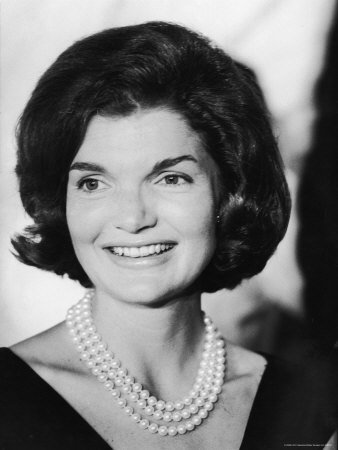
Jackie Kennedy talked about JFK assassination
Audio documents have been made by a famous American historian, Arthur Schlesinger Jr. M, few months after JFK’s death, on 22 November 1963. The documents were sealed until now in a hidden safe of Kennedy Library in Boston.
Recordings will unveil her version about the assassination of JFK and show that she strongly believes that former U.S. President was assassinated at the Vice President, Lyndon B Johnson, and several businessmen, who had interests in the Vietnam War and Bano oil contracts, command. Lyndon B Johnson became the successor of the former U.S. leader.
“She became convinced that the then vice president, along with several businessmen in the South, had orchestrated the Dallas shooting, with gunman Lee Harvey Oswald – long claimed to have been a lone assassin – merely part of a much larger conspiracy,” wrote The Daily Mail.
Lyndon B Johnson (LBJ) was a Texas-born and served as the state’s governor and senator, completed JFK’s term and went on to be elected president in his own right.
Jackie Kennedy, who eventually married to Greek shipping tycoon, Aristotle Onassis, had ordered that recordings should not be released until 50 years after her death, with some reports suggesting she feared that her revelations might make her family targets for revenge.
The former First Lady died 17 years ago from cancer, aged 64, and now her daughter, Caroline Kennedy’s agreed to release the recordings early,although the term required by Jackie O. would accomplish in 2044.[googlead tip=”vertical_mic”]

Jackie Kennedy Onassis believed Lyndon B Johnson was behind JFK assassination
The tapes will be aired by U.S. network ABC, and the British broadcasters are in talks to show it in UK too.
ABC executives said the tapes’ revelations were “explosive”.
The secret recordings are believed to include the suggestion that JFK was having an affair with a 19-year-old White House intern, with Jackie Kennedy even claiming that she found knickers in their bedroom.[googlead tip=”lista_mica” aliniat=”stanga”]

The First Lady, Jackie Kennedy had an affair with Hollywood star William Holden
And they go on to reveal that she too had affairs. The first one was with the Hollywood star William Holden, and the other one with Gianni Agnelli, the Fiat founder – as a result of the president’s indiscretions. It has also been claimed that, in the weeks before former president Kennedy’s assassination, the couple had turned a corner in their relationship and were planning to have more children.
According to the historian Edward Klein, who has written several books on the Kennedy family,[googlead tip=”patrat_mic” aliniat=”dreapta”]
“Jackie regarded the pretty young things in the White House as superficial flings for Jack. She did retaliate by having her own affairs. “
“There was a period during which she was delighted to be able to annoy her husband with her own illicit romances.”

JFK, Jackie and Caroline Kennedy, who agreed to the early release the secret tapes in exchange for ABC dropping its $20million “The Kennedys” drama miniseries.
It is also believed that Caroline Kennedy, 53, agreed to the early release of the tapes in exchange for ABC dropping its $20 million the “The Kennedys”drama miniseries.

"The Kennedys" series
“The Kennedys”, starring Tom Cruise’s wife Katie Holmes as Jackie, critically charted the family’s political and personal trials and tribulations since the 1930s. The series was eventually broadcast on an independent cable channel, and on BBC2 in the UK, against Caroline Kennedy’s wishes.






















